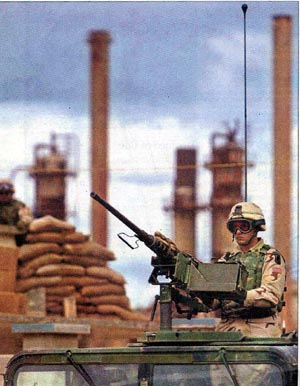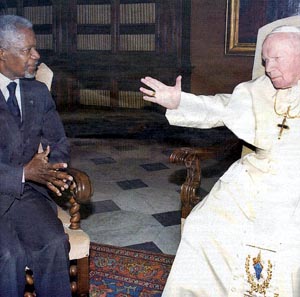 |
War against Terrorism
Excerpts from
The War: To the "Defeated" Go the Spoils
James V. Schall, S.J.
Professor of Government at Georgetown University.
National Review writer and author of Another Sort of Learning, At the Limits of Political Philosophy, and other books.
Americans do not seek to rule or to control Iraq or profit from it, though some will profit and some control needs to be exercised. If things work out as the war planners have sought, contrary to the old saying, the victors will receive no spoils. The only people who seem to be looking for spoils are the French, Germans, and Russians, holed up in St. Petersburg. These nations did not choose to fight but to let the tyranny go on. To be sure, it will cost the victors a “bloody fortune,” as the British say, in reestablishing Iraq. Wars in our tradition are fought for security and safety, even of the enemy’s population. Any wonton abuse of the opponent population by allied forces will be prosecuted. The spoils of war, to repeat, will not go to the victors but to the defeated.
 |
Today a U.S. soldier guards an oil refinery
in Kirkuk, Iraq.
"During the first Gulf War, the Americans controlled the Kuwaiti oil fields. They returned them." - J.V. Schall
Los Angeles Times, April 18, 2003 |
Every effort will be made to repair or replace what was damaged by a stubborn and radical regime that did not choose to disarm or surrender to save its own people – a people, evidently, longing to be free of this tyranny. We can, perhaps, admire the grandeur of a lost cause, but not when the cause was preserving one of the worst minor tyrannies of recent decades. The extent of this tyranny has evidently been known and not reported for some time now. Those who opposed or still oppose the war in Iraq now have the record of the brutality of this regime on their own consciences. Without determined military action, nothing would have happened. All the rhetoric about more “negotiations” was just that, rhetoric. Nothing would have happened but the preservation of the tyranny. One is hard pressed to see this to be a noble cause.
Many insist on seeing that the war is for oil. I have even seen a cardinal cited as implying this simplistic idea. During the first Gulf War, the Americans controlled the Kuwaiti oil fields. They returned them. President Bush has stated that the Iraqi oil fields wealth would be put in trust for the Iraqi people. We all need oil, but we do not necessarily need the Iraqi oil, though the French may need it. The single most important thing that we can do to undermine renegade Arab power is to develop quickly a substitute for oil, no doubt the hydrogen engine of which the President spoke in the State of the Union message. Much of the ideological terror we see in the world is supported by oil payments, that is, by ourselves, and their use by Arab governments, especially the Saudi.
This has been the most “accurate” war, in terms of weapons usage, ever fought in the history of warfare. Though some incidental damage and death have occurred, it has been remarkably small. For the most part, the targets that were hit were the ones that were intended and limited in scope to military-related sites, this often at the peril of Allied troops. Most damage was measured. If one thinks that car bombs and suicide killings are immoral and uncontrolled weapons of destructions, outside the limits of legitimacy, then the Iraqi are guilty of using them. We begin to tally the sorts of weapons of all kinds that the Iraqi possessed Their military leaders have been warned that they will be considered war criminals if they do. No doubt one of the main stories of this war will be just what the Iraqi did have and, even more interesting, in what language the bills of their purchased instruments of war was written.
 |  |
"Many religious leaders have been cited as saying that war is always wrong .... the war is immoral."
The Tidings, February 28, 2003 |
Much has been made of the religious opposition to the war. Many religious leaders have been cited as saying that war is always wrong, that more harm than good will necessarily occur, that some other solution was certainly possible, that more negotiations or time or effort would have worked, that the United Nations would do the job, therefore, the war is immoral. The proposition that “war is always wrong” is both utopian and simplistic. Wars define eras. To be on the losing side of a war is a major disaster, particularly if the enemy is, say Islam, or the Nazis, or the Soviets, or the Chinese Communists. Liberty and truth require defense, protection. Wars of some sort are always going to be with us. To think otherwise, to prepare one’s country for this “belief,” is to court disaster. Kantian or Hegelian type theories about perpetual peace or a world with no armies or force are irresponsibly unrealistic. Peace has to be purchased, re-purchased, defended ....
Religious leaders warned before the war that going to war was a grave moral responsibility. None of those who chose to go to war doubted this or acted as if they did. What they did doubt was the morality of doing nothing. Most political leaders were well aware that if they did nothing and some reduplication of 9/11 happened, they would immediately be accused of irresponsibility in not doing anything to prevent it.
We can, in one sense, worry about the success of new weapons. How long will it take a terrorist organization, especially one backed up by or protected by a radical state, to buy or develop its own “smart bomb” to deliver accurately and silently on one of our cities? One of the major reasons for the fall of communism, at least on the military side, was the inability of the Soviet union to keep up with the technical side of the war. The very success of accurate weaponry, aside from its moral value in targeting specific targets, requires a system of continual development and defense against those who possess versions of these same more sophisticated weapons. Ironically, it seems that the Iraqi war plan was in part designed by Russian generals, an indication that Russian generals still do not get the point of advanced modern war. This war in fact is a war that has totally revolutionized most previous military thinking and planning. It has in fact sent a shock wave across the world about what the nature of future wars will be. The day of mass war may well be over, the surgical war may have arrived. I suspect the world is much safer because of it.
Success in the battle field is not success at the peace table, though it is a necessary condition and carries much weight. This is one of the lessons of war. On the other hand, those who maintain that war never does any good are quite wrong and show a strange reading of military history. Wars clarify boundaries, and through them, principles. Thus far, in the Arab world for the past hundred years, it has been the military forces subduing the more fanatical elements that have kept a relative peace ....
The wars of the 21st century will not be ideological-type wars arising out of application of European philosophy to the political order, as they were in the 20th Century, lethal as they were. They will be in some sense wars of religion, whatever we choose to call them. Our liberal ideology prevents us from calling things by their proper names, to our harm. This does not mean that every effort of exchange or understanding needs to be curtailed. Just the opposite. One of the main lessons of the current war in Iraq is that no dialogue will take place without the presence of force, and even then it may not occur, a fact that should not lead us to conclude that some other way is in fact either possible or better in the given circumstances.
The Iraq war is an incident in or aspect of a broader war on what we choose to call “terrorism,” almost as if Terrorism is another country someplace This war on “terrorism” continues, though the military statement made in Iraq changes the terms of the issue. The world, particularly America, is not as “pacifist” or cowardly as was first thought. One of the worries of religious people, and it is a real worry, has to do with the degree to which a moral relativism is what in effect is spread by America and other Western powers. The America that has fought this particular war, I think, is the America of honor, purpose, determination, generosity. The native relativists have largely been against the war ....
But what we have been unprepared for is the resurgence of Islam as a moral, political, and military force that actually seeks to conquer the world. Western moral decadence has been part of its cry. At least some military and guerilla forces that might pursue this goal have been dealt a severe blow. The sudden collapse of Islam after the Battle of Vienna in the seventeenth century seems in part due to a kind of disillusionment or defeatism, a realization that it could not keep up with the West. We may see some of this attitude again, but we are also likely to see continued increase in Muslim numbers, continued demands that its world-historic mission, to use Hegel’s term, must begin again. No one wants to see this situation as a clash of civilization or religion, which is fine, so long as this hesitation does not obscure precisely what it is.
For complete text, click here

|
War | Hot Topics | Home | Books | CDs | Search | Contact Us | Donate

© 2002- Tradition in Action, Inc. All Rights Reserved
|
 |
|












